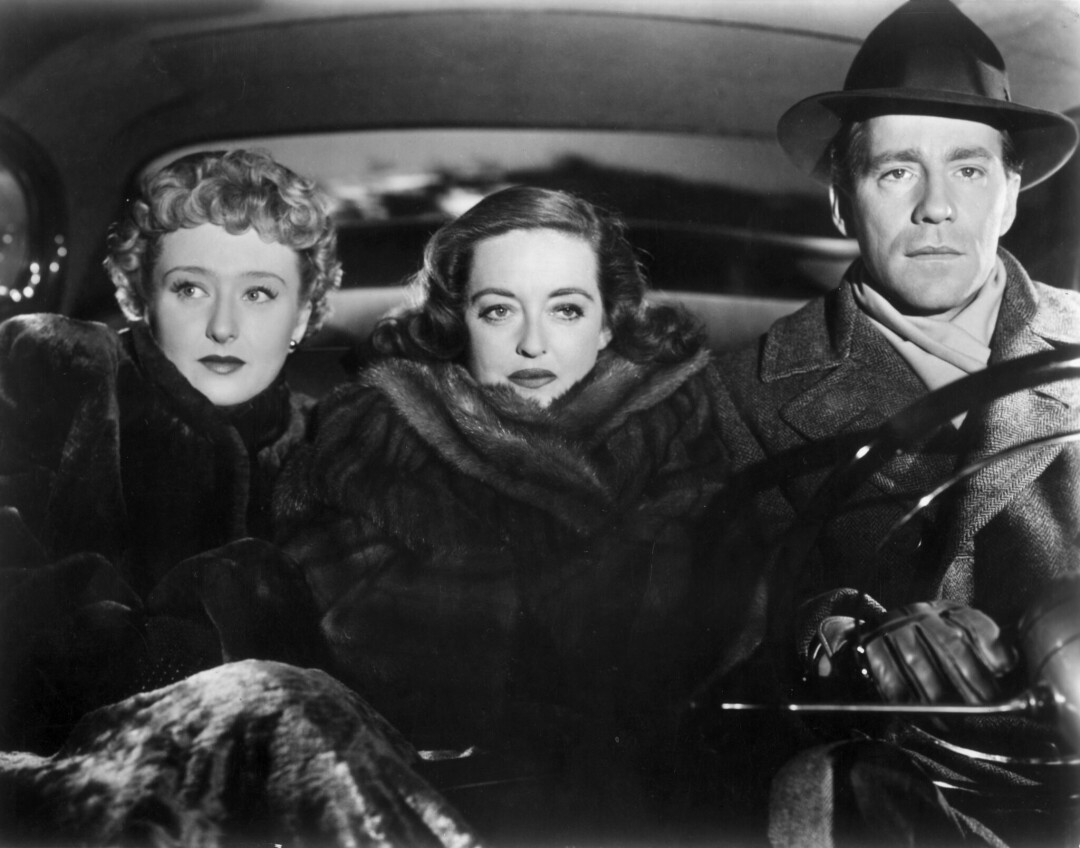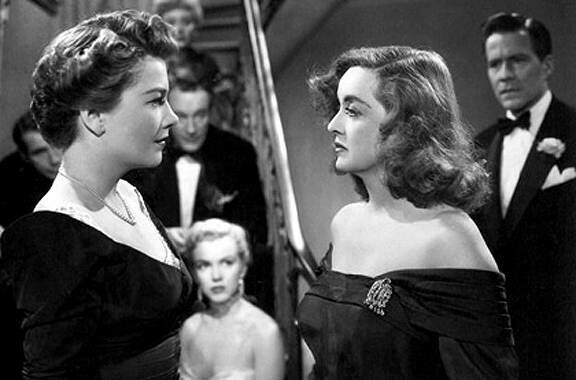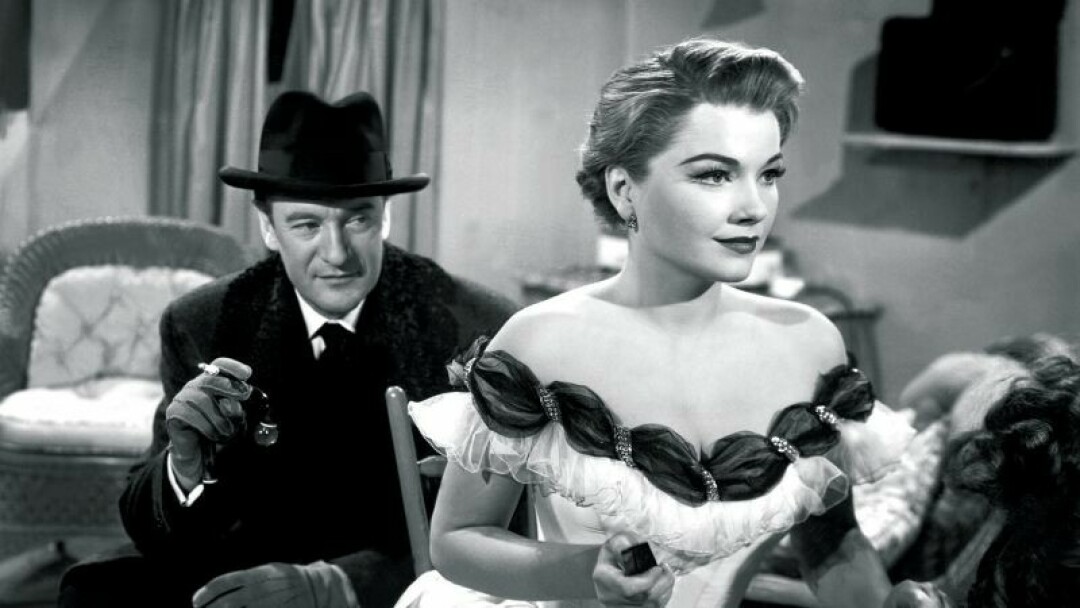‘Fasten your seatbelts. It’s going to be a bumpy night’

Joseph Mankiewicz’s 1950 backstage masterpiece All About Eve has been described as the “perfect feminist film.” It has also been described as anti-feminist because the main character, Margo Channing (Bette Davis), gives up a successful career to get married, and even has a line in a monologue saying a woman’s life isn’t complete without a man at home: “Funny business, a woman’s career – the things you drop on your way up the ladder so you can move faster. You forget you’ll need them again when you get back to being a woman. That’s one career all females have in common, whether we like it or not: being a woman. Sooner or later, we’ve got to work at it, no matter how many other careers we’ve had or wanted. And in the last analysis, nothing’s any good unless you can look up just before dinner or turn around in bed, and there he is. Without that, you’re not a woman…”
I’m not going to choose sides on this one. I will say you are not going to find many films from the period, or anywhere, really, with as many strong female characters as are assembled here. And the backstory is that Mankiewicz wrote the screenplay because he didn’t like the way women of a certain age were treated in his business.
All About Eve tells the story of established theater star Margo Channing and the young wannabe Eve Harrington (Anne Baxter), who wants to be the next big thing by worming her way into Margo’s circle and becoming her backstabbing understudy.
All About Eve was nominated for a record-breaking 14 Oscars (a record unbroken until Titanic tied with 14 nominations in 1998), and won six of them, including Best Picture. Best Actress that year was something of a shock when it went to Judy Holliday for Born Yesterday. She was facing Gloria Swanson in Sunset Boulevard and both Davis and Baxter for All About Eve. Baxter had insisted that the studio include her name in Best Actress nominations, rather than supporting actress, which some have said split the voting and deprived Davis of what should have been her award.
And it remains the only film in history to earn four female Oscar nominations – in addition to Davis and Baxter, two other great actors, Celeste Holm (as Margo’s friend and later traitor, Karen Richards) and Thelma Ritter (as Margo’s assistant Birdie Coonan) were nominated in the Best Supporting Actress category. But 1950 was a very good year for film, and the award in that category went to Mercedes McCambridge, making her film debut in All the King’s Men (23 years later she would provide the scary voice of Pazuzu in The Exorcist).

Eve and Margo face-off as their co-stars watch from a staircase. The woman between them is Marilyn Monroe, in her first screen role, playing dumb blonde starlet Claudia Casswell.
All About Eve was perfect timing for Davis. After 18 years of being top dog at Warner Bros., she left to star in a series of flops for other studios. Her career at age 41 appeared to be on the ropes. She later said playing the big, fat role of the 40-year-old theater diva with some of the best lines ever written was the greatest break she’d ever gotten. “As I told Joseph Mankiewicz, it resurrected me from the dead.”
Just before taking the role, she had turned down the lead role in a filmed version of a female prison drama Women Without Men, saying she would not appear in any “dyke movie.” Instead, Eleanor Park starred in the retitled Caged and was nominated for an Oscar. Davis also famously turned down the lead role for the 1951 film The African Queen when she learned it was actually being shot in Africa. The role went instead to Katharine Hepburn, who was nominated for an Oscar.
For better or worse, All About Eve also introduced Davis to the man who would become her fourth and final husband, co-star Gary Merrill. Davis apparently liked hairy men, and Merrill was very hairy. It was her longest marriage, lasting 10 years.
The idea for the film came from a sort story in Cosmopolitan called “The Wisdom of Eve.” The working title for the film was Best Performance, but studio head Darryl Zanuck is credited with pulling a line from the script for the title – All About Eve.
A number of top actresses had been considered for the role of Margo Channing. The final choice was Claudette Colbert, who was 46 at the time and mostly known for wholesome roles. It’s impossible to imagine her s Margo Channing because Davis owns it so. Two weeks before production was to begin on All About Eve, Colbert dropped out due to a disc injury she suffered portraying Agnes Newton Keith in the film of her World War II memoir about being in a Japanese prison camp in Borneo, Three Came Home.
About that twist of fate, Colbert later said: “I just never had the luck to play bitches.”
And nobody played them better than Davis (for example, Mildred Rogers in Of Human Bondage in 1934, Jezebel in 1938, murderous Leslie Crosbie in The Letter in 1940, Regina Giddens in Lillian Hellman’s The Little Foxes in 1941).
But Margo Channing is full of stunning self-awareness when she utters what may be my favorite line in a movie full of great lines: “ Infants behave the way I do, you know. They carry on and misbehave. They’d get drunk if they knew how.”
Davis was known to be so fiercely in control of whatever character she was working on that she often rewrote lines to fit what she believed the character would say, but she recognized the caustic beauty of Mankiewicz’s script and stuck to what he had written for her, which includes some of the most famous lines in moviedom, including the headline of this piece.
Another major attraction for me is the presence of one of my favorite actors of the period, George Sanders. His honeyed, cynical voice (17 years later he famously put voice to Shere Khan in Disney’s The Jungle Book) is the first thing we hear in All About Eve. His voiceover introduces us to his character: “To those of you who do not read, attend the theater, listen to unsponsored radio programs, or know anything of the world in which you live, it is perhaps necessary to introduce myself. My name is Addison DeWitt. My native habitat is the theater. In it, I toil not, neither do I spin. I am a critic and commentator. I am essential to the theater.”
He was certainly essential to the movie, earning the Best Supporting Actor Oscar. DeWitt has many of the juiciest lines, including this fun exchange with wannabe starlet Claudia Casswell (Marilyn Monroe in her film debut):
Miss Casswell: Oh, waiter!
Addison DeWitt: That is not a waiter, my dear, that is a butler.
Miss Casswell: Well, I can’t yell “Oh butler!” can I? Maybe somebody’s name is Butler.
Addison DeWitt: You have a point. An idiotic one, but a point.
In 1972, at age 65, Sanders swallowed five bottles of Nembutal in a hotel room in Spain, leaving behind this note: “Dear World: I am leaving because I am bored. I feel I have lived long enough. I am leaving you with your worries in this sweet cesspool—good luck.”
If you watch All About Eve on the Criterion Channel, be sure to check out the treasure trove of extras.
Lots of fascinating stuff, including a curious short documentary about the real people behind the short story that inspired the movie, two documentaries on writer/director Mankiewicz, and separate Dick Cavett interviews with Bette Davis and Gary Merrill – while Cavett and Davis don’t discuss All About Eve, it’s fascinating to see the grand dame of Hollywood be so honest about herself and to see her laugh with real humor, and even toss out a spontaneous joke.

George Sanders as theater critic Addison DeWitt with his protege Eve Harrington (Anne Baxter) in Joseph Mankiewicz’s 1950 masterpiece All About Eve.
